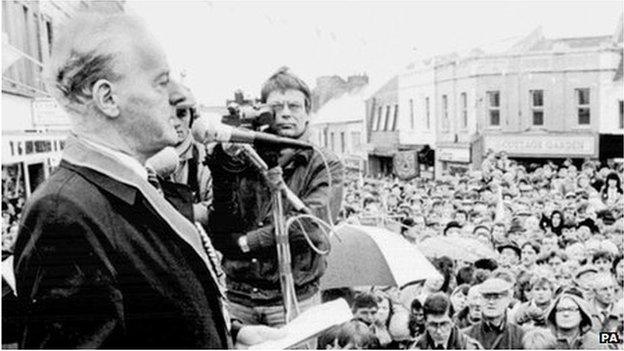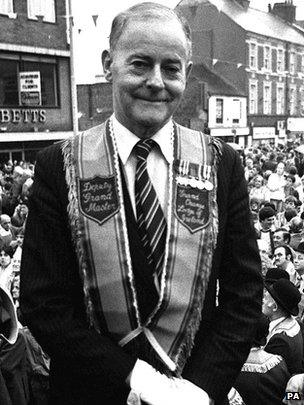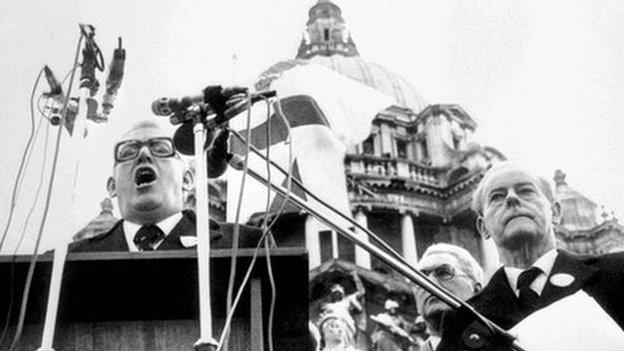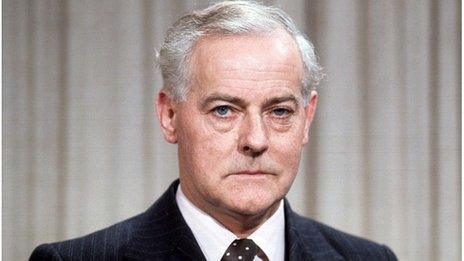James Molyneaux: Obituary of former UUP leader
- Published
BBC News NI Political Editor Mark Devenport looks back at James Molyneaux's political career
James Molyneaux once described himself as "the dull old dog of Ulster politics".
In a career that spanned three decades, he was not one for "high-wire" acts or headline grabbing, he said.
The former Ulster Unionist Party (UUP) leader's style was quiet but determined.
His life's work was to protect Northern Ireland's position within the United Kingdom and he viewed himself as a gatekeeper of the Union.
James Henry Molyneaux - known as Jim - was born into a farming family in the village of Killead, County Antrim, on 27 August 1920.
Fifty-six years after the liberation of Belsen, former Ulster Unionist leader Lord Molyneaux returned to location of the concentration camp in Germany.
At the age of 21, he joined the Royal Air Force (RAF), spending more than five years in the service during World War Two.
At the end of the war, he was among the first British troops to enter the newly liberated Belsen concentration camp in Germany.
He witnessed at first hand the horror of the Holocaust. What he was to see there was to leave an indelible mark on his life.
Fifty years later, at the age of 81, he returned to Belsen with a documentary team to reflect on man's inhumanity.
Rise
"The sense of shock hit you like a tidal wave. Every step brought further horror. It was the work of the devil," he told the BBC Spotlight programme in 2001.
Molyneaux's political career spanned more than three decades. He joined the Ulster Unionist Party in 1946 and went on to become one of its longest-serving leaders.

A quiet and determined politician
His rise through party ranks began in a coincidental way at Ballynadrentagh Orange Hall in Crumlin, County Antrim.
Molyneaux went to repair the heating and ended up as chairman of the Diamond branch of the party.
He was not one, he said, for point-scoring or headlines.
If there was one overriding principle for his years in politics it was the safety of the Union. He saw himself as a kind of gatekeeper of it.
More MPs
"I place the safety of Northern Ireland within the Union as my absolute priority and I will not be cajoled into any form of phoney structure that would endanger that position," he said.
Molyneaux was a bachelor who devoted himself to promoting the Unionist cause in Parliament.
He was MP for South Antrim from 1970 to 1983 and for Lagan Valley from 1983 to 1997.

A dedicated member of the Orange Order
He played a leading role in persuading the Labour government of James Callaghan in 1976-79 to give Northern Ireland more MPs.
In 1979, Molyneaux succeeded Harry West as UUP leader.
He had a strong powerbase in the Orange Order and rose to become its world head and the Sovereign Commonwealth Grand Master of the Royal Black Institution.
Such a position kept him in touch with grassroots Protestant opinion - and he kept a finger on the pulse.
Anglo-Irish Agreement
He held his party together for 17 years in the face of a continued challenge from the Democratic Unionist Party (DUP) leader, Rev Ian Paisley.
Throughout the 1980s he was a member of the right-wing Conservative Monday Club, of which he later became vice-president.
Molyneaux also attracted Westminster personalities such as Enoch Powell to the UUP.
The signing of the Anglo-Irish Agreement in 1985 was a major blow to Molyneaux, who had taken comfort from Margaret Thatcher's rejection of a New Ireland Forum report.
Mr Paisley called for his resignation but, a year later, they formed a political pact and shared a platform for a huge "Ulster says No" anti-agreement rally at Belfast City Hall.
During the prolonged "talks about talks" with Northern Ireland secretaries of state, Molyneaux described power-sharing as a "dead duck".
The UUP was divided between those who wanted devolution and those sceptical of the government's intentions.

Sharing a platform with his old rival Ian Paisley at the "Ulster says No" rally

Pictured in 1987 at the launch of the unionist election manifesto
Molyneaux held them together - travelling to Dublin for talks but insisting on changes to the Republic of Ireland's constitution.
He was positive about the Downing Street Declaration in 1993.
It came the day before the creation of the Northern Ireland Select Committee for which unionists had lobbied for years.
Judas jibe
Some said a deal had been done. But Molyneaux denied there had been any sell-out.
His initial positive response to the Downing Street Declaration enraged the DUP and Mr Paisley labelled the UUP leader a "Judas Iscariot" - a jibe that cut deep.
"I would not be unforgiving. I'm too much of a Christian for lack of forgiveness," Mr Molyneaux said.
"The problem is, how do we convince the general public ever again when the two of us worked together through all of those dark days, talked together and prayed together and then, this happens? ...It is a shattering blow."
When the IRA declared a ceasefire in 1994, Molyneaux reassured unionists that no secret deal had been done.

He defended the Downing Street Declaration
The 1995 Framework Document marked the beginning of the end for his political career.
He had not been at the centre of negotiations between the British and Irish governments, which agreed on setting up cross-border bodies with executive powers.
Molyneaux survived a leadership challenge a month later, but stood down from his position on his 75th birthday, making way for David Trimble.
Knighthood
His Lagan Valley seat went to his protégé Jeffrey Donaldson, who later left the party for the DUP.
He was knighted in 1996 and was granted a life peerage in the 1997 Birthday Honours list, becoming Lord Molyneaux of Killead.
When the DUP overtook the UUP in the Northern Ireland Assembly elections of November 2003, Molyneaux supported calls for Mr Trimble's resignation.
Unless UUP members addressed their difficulties, they would never win another election in his lifetime, he said.
Molyneaux often quoted Harold Macmillan's words: "Quiet, calm deliberation disentangles every knot."
That, he said, was his way.